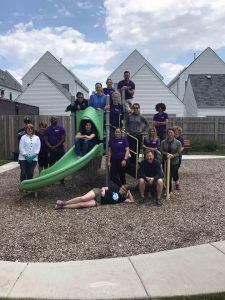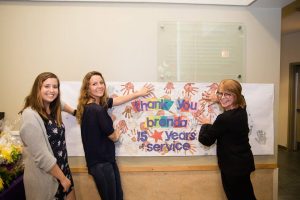One morning on my commute to work, the woman sitting next to me on the train struck up a conversation with me, as we are often on the same train for a portion of our respective commutes. I took two things away from that conversation, the first being that I am fooling no one in my efforts to seem like a seasoned Chicago 9-5er, as she immediately intuited that I am an intern. The second thing I took away was her reminder that I am looking at the next forty years of my life in the workforce. I’m not sure if that piece of sage wisdom was supposed to terrify me (40 years of working seems pretty daunting), and at first it definitely did. With time, however, I’ve come to regard that statement as crucial in my personal journey to find a career or goal to work towards in my life that I feel called to do.
I’ve been working at Concordia Place for five weeks now. Concordia Place is a Lutheran non-profit whose mission is basically to support members of the community at all stages of life, from early childhood to the teenage years to retirement, through accessible services that have arisen out of the need Concordia Place identifies in the communities it serves. I am shocked that the time has flown by so quickly, but the abundance of things that I have learned about myself, nonprofits, and the needs that often go unmet in the Chicago area community, are proof of the passage of time.
My supervisor, Cameron, has been awesome about taking me along on her meetings around the city, whether it be with Concordia Place board members, public relations consultants, or potential donors, and helping me to understand how a nonprofit runs from all different angles. For a nonprofit that I had never heard of until my involvement in CAPS, Concordia Place has a large and impressive network of players and contributors, and the people of Concordia Place have worked tirelessly to get this far. In a political and social climate that has presented charitable need in so many different areas and issues, I am impressed by how Concordia Place continues to grow.
In a recent meeting I accompanied Cameron to, I learned about the concept of compassion fatigue. Compassion fatigue is best described as a feeling of indifference towards charitable campaigns addressing even the most important of issues, due to a saturation of appeals for aid for various social issues. As human rights are infringed upon with increasing frequency lately, there are just too many problems vying for attention. For example, it might be difficult for Planned Parenthood to campaign for funds right now, when the ACLU is also campaigning for funds to help families separated at the border, which is a recent social issue that is dominating the news cycle. Both organizations work towards a very worthy cause, yet people cannot put their time, energy, and money into an infinite number of worthy causes. They do what they can, and no one can do it all.
As a college student who is lucky enough to attend Valpo and feel safe and at peace in my privileged bubble in Indiana, it is easy to understand how compassion fatigue comes about. Eventually, we just stop talking about social injustices and things occurring in our country that are against our personal convictions, because they are too numerous, and the thought of all that needs to be fixed in the world is overwhelming and upsetting. And because these injustices often are not directly impacting those as privileged as myself, we can just push these thoughts aside. This is a dangerous pattern of ignorance and comfort to fall into.
This CAPS fellowship couldn’t have come at a better time, as I myself was beginning to fall into this pattern. What could I, an average college student, do to help fix any one of these problems? It often felt like the answer to that was nothing. Now, working for a nonprofit, I see that there is so much that I can personally contribute with my talents and gifts, and even more importantly, so much that can be done when numerous compassionate and driven minds come together for change. Compassion fatigue is a very real phenomenon, but one that can be combated with passion and persistence. I’ve learned that any progress towards change is worth being celebrated, no matter how great or small. And optimism is key.
If I’m looking at the next forty years of my life, the nonprofit sector seems like a great option as a place to spend them. The lady on the train’s terrifying advice now suddenly seems terrifying for a different reason, in that forty years doesn’t seem like nearly enough time to achieve all that I wish in making this world a better place. Although at times it may feel both difficult and hopeless to fix social issues, I feel called to push aside compassion fatigue and just do what I can with what I have to fight for change.

